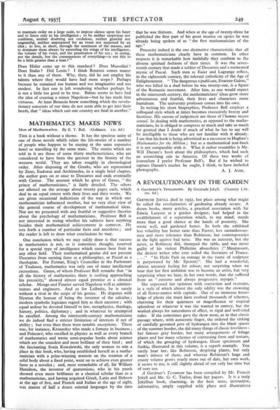MATHEMATICS MAKES NEWS
Men of Mathematics. By E. T. Bell. (Gollancz. x2s. 6d.)
Tats is a book without a theme. It has the specious unity of one of those novels which relate the life-stories of a number of people who happen to be staying at the same expensive hotel or travelling by the same train. The stories which are told in it are those of some thirty mathematicians, who are considered to have been the greatest in the history of the western world. They are taken roughly in chronological order. After disposing of the Greeks, who are represented by Zeno, Eudoxus and Archimedes, in a single brief chapter, the author goes on at once to Descartes and ends eventually with Cantor. The account which he gives of Gauss, " the prince of mathematicians," is fairly detailed. The others are allotted on the average about twenty pages each, which deal to an equal extent with their lives and their works. We are given occasional indications of the way in which one mathematician influenced another, but no very clear view of the general course of development of mathematical ideas. Nor are we presented with any fruitful or suggestive theories about the psychology of mathematicians. Professor Bell is not interested in seeing whether his subjects have anything besides their mathematical achievements in common. He sets forth a number of particular facts and anecdotes ; and the, reader is left to draw Whit conclusions he may.
One conclusion which we may safely draw is that success in mathematics is not, as is sometimes thought, reserved for a special type of intelligence which cannot bear fruit in any other field. Their mathematical genius did not prevent Descartes from earning fame as a philosopher, or Pascal as a theologian. For Fermat, King's Councillor in the Parlement of Toulouse, mathematics was only one of many intellectual recreations. Gauss, of whom Professor Bell remarks that "in all the history of mathematics there is nothing approaching his precticity," showed almost equal promise as a classical scholar. Monge and Fourier served Napoleon well as adminis- trators and engineers.. And as for Leibnitz, he is surely without a rival in the scope of his genius. He disputes with Newton the honour of being the inventor of the calculus ; modern symbolic logicians regard him as their ancestor ; with equal ardour he devoted himself to law, metaphysics, theology, history, politics, diplomacy ; and in whatever he attempted he excelled. Among the nineteenth-century mathematicians we do indeed find a stricter limitation of interests if not of ability ; but even then there were notable exceptions. There was, for instance, Kronecker who made a fortune in business ; and Poincare, who excelled in physics as well as every branch of mathematics and wrote semi-popular books about science which are the soundest and most brilliant of their kind ; and the fascinating Sonja Kowalewski, the only woman to win a place in this book, who, having established herself as a mathe- matician with a prize-winning memoir on the rotation of a solid body about a fixed point, went on to achieve even greater fame as a novelist ; and, most remarkable of all, Sir William HaMilton, the inventor of quaternions, who in his youth showed even more brilliance as a classical scholar than as a mathematician, and having acquired Greek, Latin and Hebrew at the age of five, and French and Italian at the age of eight, was master of half a dozen oriental languages by the time that he was thirteen. And when at the age of twenty-three he published the first part of his great treatise on optics he was already being spoken of as " the first mathematician of the age."
Precocity indeed is the one distinctive characteristic that all these mathematicians clearly have in common. In other respects it is remarkable how faithfully they conform to the diverse spiritual fashions of their times. It was the seven- teenth century that made a soldier of Descartes and a tormented mystic of Pascal. Such men as Euler and Lagrange reflect, in the eighteenth century, the tolerant catholicity of the Age of Enlightenment. " The dangerous republicain, Evariste Galois," who was killed in a duel before he was twenty-one, is a figure of the Romantic movement. After him, as one would expect in the nineteenth century, the mathematicians' ideas grow more adventurous and fruitful, their lives and characters more humdrum. The university professor comes into his own.
In writing his short biographies, Professor Bell employs a colloquial style which at times becomes excessively breezy and facetious. His canons of judgement are those of l'homme moyen sensuel. In dealing with mathematics, as opposed to the mathe- maticians, he is obliged to compress so much and take so much for granted that I doubt if much of what he has to say will be intelligible to those who are not familiar with it already. I see that his book is being advertised as a successor to Hogben's Mathematics for the Million ; but as a mathematical text-book it is not comparable with it. What it rather resembles is Mr. Will Durant's book about the philosophers, which had such an astonishing sale in America. Of these two works of journalism I prefer Professor Bell's. But if he wished to capture Durant's market he ought, I think, to have included






































 Previous page
Previous page